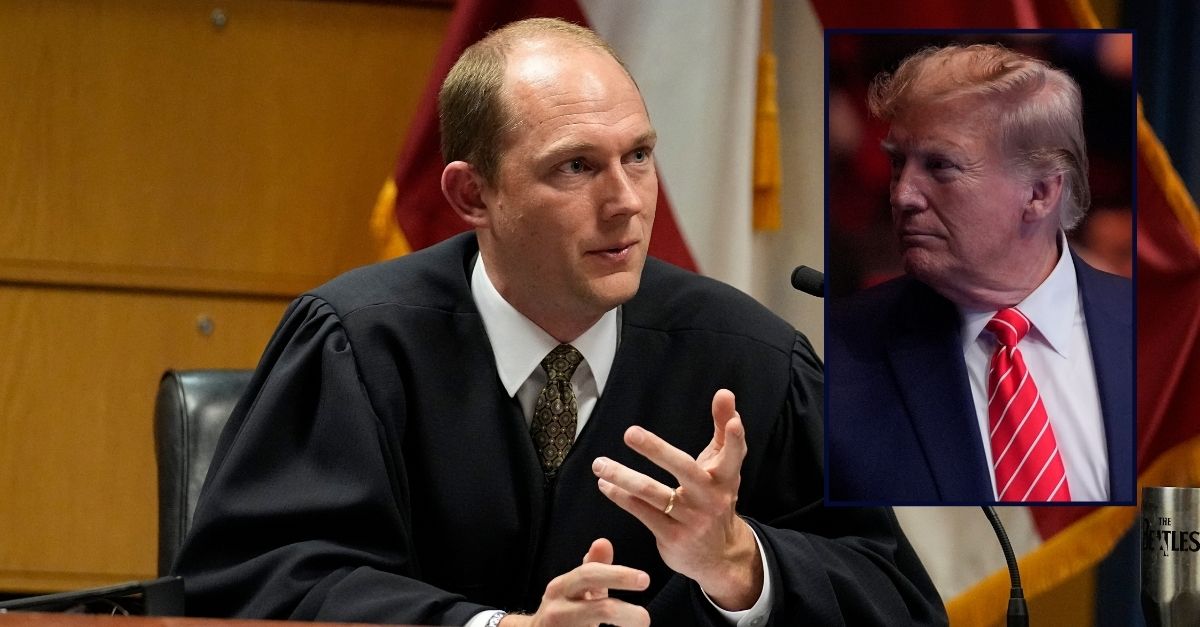

Main image: Fulton County Superior Judge Scott McAfee speaks in court, Feb. 27, 2024, in Atlanta. (AP Photo/Brynn Anderson, Pool); Inset right: Former President Donald Trump waits for the start of a UFC 299 mixed martial arts bout, March 10, 2024, in Miami. (AP Photo/Wilfredo Lee)
The judge overseeing the Georgia racketeering (RICO) and election interference case against Donald Trump dealt the defense a blow by ruling against a First Amendment challenge to the indictment.
In late March, Trump’s Atlanta-based lawyer Steve Sadow argued that conspiracy charges against his client should be dismissed because they run afoul of U.S. Supreme Court precedent protecting specifically falsehoods and lies. On Thursday, the court rubbished that argument.
“They argue this prosecution violates the First Amendment’s protections of political speech and activity, freedom of association, and the right to petition Congress as-applied to their alleged conduct,” Fulton County Superior Court Judge Scott McAfee wrote in the 14-page order. “[T]he Court finds these vital constitutional protections do not reach the actions and statements alleged by the State. Nor do the statutes themselves facially violate the First Amendment.”
The crux of the defense’s argument was that Fulton County District Attorney Fani Willis had unlawfully prosecuted the 45th president by criminalizing statements he made following, and related to, the 2020 presidential election that were “the height of political speech.”
The heart of the defense’s free speech as-applied challenge was that Fulton County prosecutors put the cart before the horse by operating on the assumption that Trump was trying to do something illegal in the first place and then used his undisputed speech to try and prove it.
“What the state wants to do is say, ‘We have a goal, we have an objective here that we put forward: steal the election in an unlawful fashion,'” Sadow said during the motions hearing. “I say change that for a second to: legitimate concern about the validity of the election. If that was the way you focused on it — which is a way to do it as-applied, even with the facts — would what president Trump said on those counts be a protected speech? The answer is: It has to be.”
Trump’s attorneys also moved to dismiss some of the charges because they are based on Georgia laws which criminalize making false statements under certain circumstances — without any materiality component. Sadow said those statutes, when being applied to “political discourse,” are clearly unconstitutional.
McAfee did not buy the free speech argument.
“Defendants’ expressions and speech are alleged to have been made in furtherance of criminal activity and constitute false statements knowingly and willfully made in matters within a government agency’s jurisdiction which threaten to deceive and harm the government,” the court’s Thursday order reads. “Even core political speech addressing matters of public concern is not impenetrable from prosecution if allegedly used to further criminal activity.”
The court also pointed out that a false statement made knowingly and willfully in a matter under a government agency's authority that also threatens to deceive and harm the government is not protected by the First Amendment and can be prosecuted.
Some of the defendants also made claims against some of the charges, arguing that prosecutors used laws that broadly define any false statements and documents. facial challenges against some of the charges — arguing that prosecutors used statutes that broadly criminalize any and all false statements and false documents.
McAfee briefly dismissed those arguments by determining that the laws in question have limited scope and actually require that the defendant knew or intended that his false statement would come to the attention of an agency with authority to act on those statements.
Trump’s defense attorney disagreed with the ruling and suggested the possibility of appealing or raising the arguments again during trial.
“We respectfully disagree with Judge McAfee’s order (refusing to dismiss the indictment) and will continue to evaluate our options regarding the First Amendment challenges,” Sadow said in a statement on X (formerly Twitter). “It is significant that the court’s ruling was without prejudice, as it made clear that defendants were not foreclosed from again raising their ‘as-applied challenges at the appropriate time after the establishment of a factual record.” “Even core political speech addressing matters of public concern is not impenetrable from prosecution,” Fulton County Superior Court Judge Scott McAfee wrote. (formerly Twitter). “It is significant that the court’s ruling was without prejudice, as it made clear that defendants were not foreclosed from again raising their ‘as-applied challenges at the appropriate time after the establishment of a factual record.”
